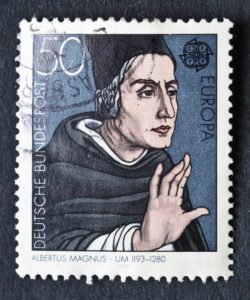
The following is a collaboration between Sister Amelia DeMarco and Sister Jeanne Shary. Sister Amelia conducted extensive research and reported on St. Albert's life and legacy. Sister Jeanne was inspired to preach at today's liturgy based on Sister Amelia's writing and today's Gospel reading from Luke 17:11-19.
Sister Jeanne's Preaching
Good morning/afternoon and happy feast day of our Dominican brother, Saint Albert the Great! My reflection today is inspired by Sr. Amelia DeMarco’s thoughts on Saint Albert as well as today’s readings.
As I look around this chapel, I see many people who share Albert’s charism. Like him, you have wholeheartedly engaged in study and then unselfishly shared your knowledge and wisdom as dedicated teachers. Albert studied just about everything while most of you studied what your superiors “suggested” that you study. But nevertheless, you did it and you did it very well. Why? Because you cared about your students. A deep and abiding generosity freely given to others in God’s name is what made Albert “great” and what makes our Dominican vocation noble.
Today’s Gospel - The Leper noticed and realized he had been healed. St. Albert noticed the world around him (natural, mental, spiritual…)
Both the Leper & St. Albert Glorified God. How are we being called to notice and engage with each other and creation in such a way that we Glorify God? What does it mean to Glorify God?
The Leper threw himself at Jesus’s feet thanking him. Albert lifted up creation through his studies, and his scientific method, teaching that all is sacred--logic and faith can be complementary. (It’s all connected)
The Call
What do we notice? What catches your eye or attracts or fascinates you? What do you want to learn more about? Today’s Gospel presses us to follow God’s invitation, break it open, and then, like Albert share it with others. And the journey will bring us together to the feet of Jesus.
We conclude with words from Sr. Amelia, another scientist.
“I dare say that if Albert were alive today, he would be interested in learning about the many breakthroughs in medicine and beyond. He would be interested in researching artificial intelligence, and would, most likely, be eager to explore its uses. Also, in his wisdom, he might add a word of caution. May we strive to emulate the deep love of God and the love of creation that Albert had.”
Sister Amelia's Research
St. Albert the Great (Albertus Magnus) was born circa 1200 in the province of Swabia in Germany. He passed away on November 15th, 1280, in Cologne. Since his father was a nobleman, he had access to an excellent education. When finished his elementary studies, he pursued a degree in liberal arts at the University of Padua. It was at Padua that he was introduced to the philosophy of Aristotle, which greatly influenced his later work. In 1223 Albert joined the Order of Preachers.
He completed his education in philosophy the theology in schools in Padua, Paris, and Cologne. After finishing his studies, he was ordained to the priesthood and taught in many places in Europe.
There is much more that can be said about St. Albert’s distinguished career as an educator. In addition to being a philosopher and a theologian, he mastered so many subjects. Some of the topics included in his encyclopedic volumes are logic, theology, botany, geography, astronomy, astrology, zoology, physiology, justice, friendship, love, etc. Some might ask what do all these mundane subjects have to do with theology. St. Albert believed that they all emanate from God and there is no disharmony among them. “All creation reveals and glorifies God in its own perfect way!”
St. Albert was unique in that he incorporated Aristotle’s philosophical principles with theology. For Albert there was no divide between faith and reason.
St. Albert sought to understand creation as a way of gaining a more profound knowledge of the Creator. Other medieval scientists of his time pursued alchemy in the hopes of changing base metals into gold or finding the liquid of life. St. Albert’s investigations/experiments were founded upon observation and analysis. He used controls in experiments, verified the results by painstakingly repeating, and came to conclusions based upon sound hypotheses. (Sound familiar? He used the scientific method.)
His view of nature is contained in his words: “The whole world is theology for us, because the heavens proclaim the glory of God.” Late in 1245, Thomas Aquinas came to Paris, where he was immediately drawn to Albert. Thomas was 25 years his junior; although he passed away 5 years before Albert. Some fellow students referred to Thomas as a “dumb ox” because he was so quiet. St. Albert noted, “This dumb ox will fill the world with his bellowing.”
God used St. Albert to help form Thomas Aquinas, who was to become the Church’s greatest theologian. “Albert laid the foundation for Thomas by helping him embrace and “Christianize” Aristotelian logic and metaphysics. Indeed, these two men together showed that faith and reason are interwoven and not exclusive of each other. Albert and Thomas enjoyed a deep mutual respect and friendship. Their use of Aristotle’s logic and metaphysics did cause them to draw some criticism upon them.
In 1277, the Bishop of Paris issued an edict condemning numerous theological propositions that originated from Aristotelian logic. Twenty of those had been written by Thomas. The Bishop believed that the propositions violated God’s omnipotence. At the age of 77, then, Bishop Albert, made the trip to Paris to defend his student, who had already died 2 years earlier. Despite any hardships, both Albert and Thomas became saints and Doctors of the Church. So, the true omnipotence of God reigned.
St. Albert was canonized by Pope Pius XI on December 16, 1931, and was at the same time declared a Doctor of the Church, (Universal Doctor). By papal decree in 1941, he was declared the patron saint of scientists and philosophers.
